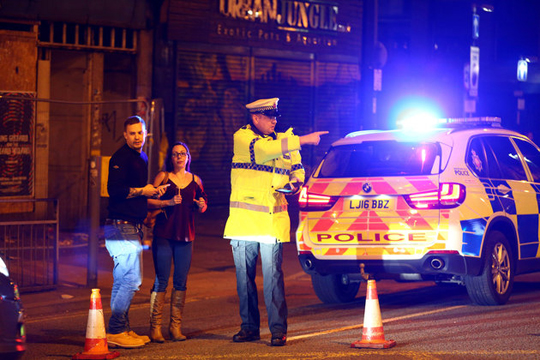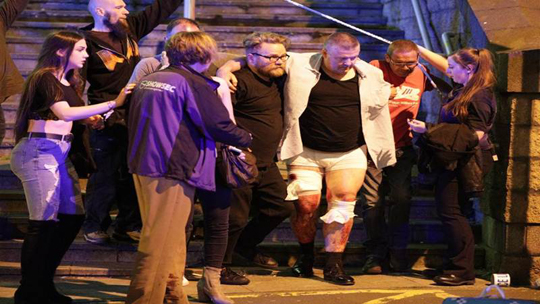London, May 23: A suicide bomber blew himself up at a crowded arena hosting US star Ariana Grande's pop concert in Manchester, killing at least 22 people and injuring 59 others, the deadliest terror attack in the UK since the 7/7 bombings of 2005.

Children and teenagers were among the dead because of the very young demographic of the pop star's fans, with desperate parents and relatives waiting for the news of loved ones after the blast struck the Manchester Arena last night.
"Our thoughts are with those 22 victims that we now know have died, the 59 people who have been injured and their loved ones. We continue to do all we can to support them. They are being treated at eight hospitals across Greater Manchester," Greater Manchester Police Chief constable Ian Hopkins said.
"This is a fast-moving investigation...We have been treating this as a terrorist incident and we believe that while the attack last night was conducted by one man, the priority is to establish whether he was acting alone or as part of a network," he said in a statement.
Police confirmed the attacker died at the arena. They said the attacker was carrying an improvised explosive device, which he detonated, causing the massive blast.
Official sources in New Delhi said they were ascertaining if there were any Indian casualties in the blast.
"Any Indians injured during Manchester attack today may reach off-office hours Public Response Unit of HCI (High Commission of India) ASAP (as soon as possible) at 020 7632 3035," the Indian High Commission here tweeted.
"We'll activate more helplines shortly to be of further assistance to families and friends of those affected by attack," it said.
Manchester, a heavily industrialised town, is home to a significant number of people from South Asia.
Prime Minister Theresa May condemned the "appalling terrorist attack". She said her thoughts were with the victims and families of those affected in "what is being treated by the police as an appalling terrorist attack".
May said the government was working to establish the full details of the incident.
The blast comes just weeks before the snap UK general election, campaigning for which was hotting up over the issue of Brexit -- the UK's exit from the European Union.

However, both May and Labour Party leader Jeremy Corbyn suspended election campaign after the Manchester attack.
British Transport Police said the explosion occurred in the foyer area of Manchester Arena that has a capacity of 21,000.
Eyewitnesses said the explosion was heard after the artist had finished her show and left the stage.
Pop star Grande's spokesperson said she was safe.
Grande, a 23-year-old American TV teen actress-turned-pop star, said that she was "broken" and at a loss for words over the deadly terror attack at her concert.
"Broken. From the bottom of my heart, I am so so sorry. i don't have words," she tweeted hours after the powerful blast.
Greater Manchester Police also carried out a "controlled explosion" in theCathedral Gardens area near the Manchester Arena, but have since confirmed the item they found was abandoned clothing and not dangerous.
Armed police lined the streets outside the arena with officers moving members of the public away and bomb disposal units at the site of the blast.
Reacting to the incident, Opposition Labour Party leader Corbyn tweeted, "Terrible incident in Manchester. My thoughts are with all those affected and our brilliant emergency services."
Manchester Mayor Andy Burnham said, "My heart goes out to families who have lost loved ones, my admiration to our brave emergency services. A terrible night for our great city."
Eyewitnesses reported hearing a loud "bang" from inside the venue.
Video footage from the scene showed bloodied victims being helped by emergency services.
"It was one bang and essentially everyone from the other side of the arena where the bang was heard from suddenly came running towards us," an eyewitness said.
"Some people were screaming they'd seen blood but other people were saying it was balloons bursting or a speaker had been popped," said another eyewitness.
The UK's Network Rail said train lines out of Manchester Victoria station, which is close to the concert venue, were blocked.
Manchester Arena is the biggest indoor venue in the city. The arena foyer connects with Victoria train and tram station, a major hub on the northern edge of the city centre.
The arena regularly hosts concerts by major stars like Grande.
Grande is currently on a European tour -- she has already played in Birmingham and Dublin and is due to be at the O2 Arena in London tomorrow and Thursday.
Last night's blast came two months after a careening driver left four people dead on London's Westminster Bridge, then stabbed to death a police officer at the gates of Parliament.
Yesterday's blast was also the deadliest after the July 7, 2005, London bombings, that were a series of coordinated terrorist suicide bomb attacks in central London.
The bombings had targeted civilians using the public transport system during the rush hour. Fifty-two people were killed and over 700 more were injured in those attacks.








Comments
Add new comment